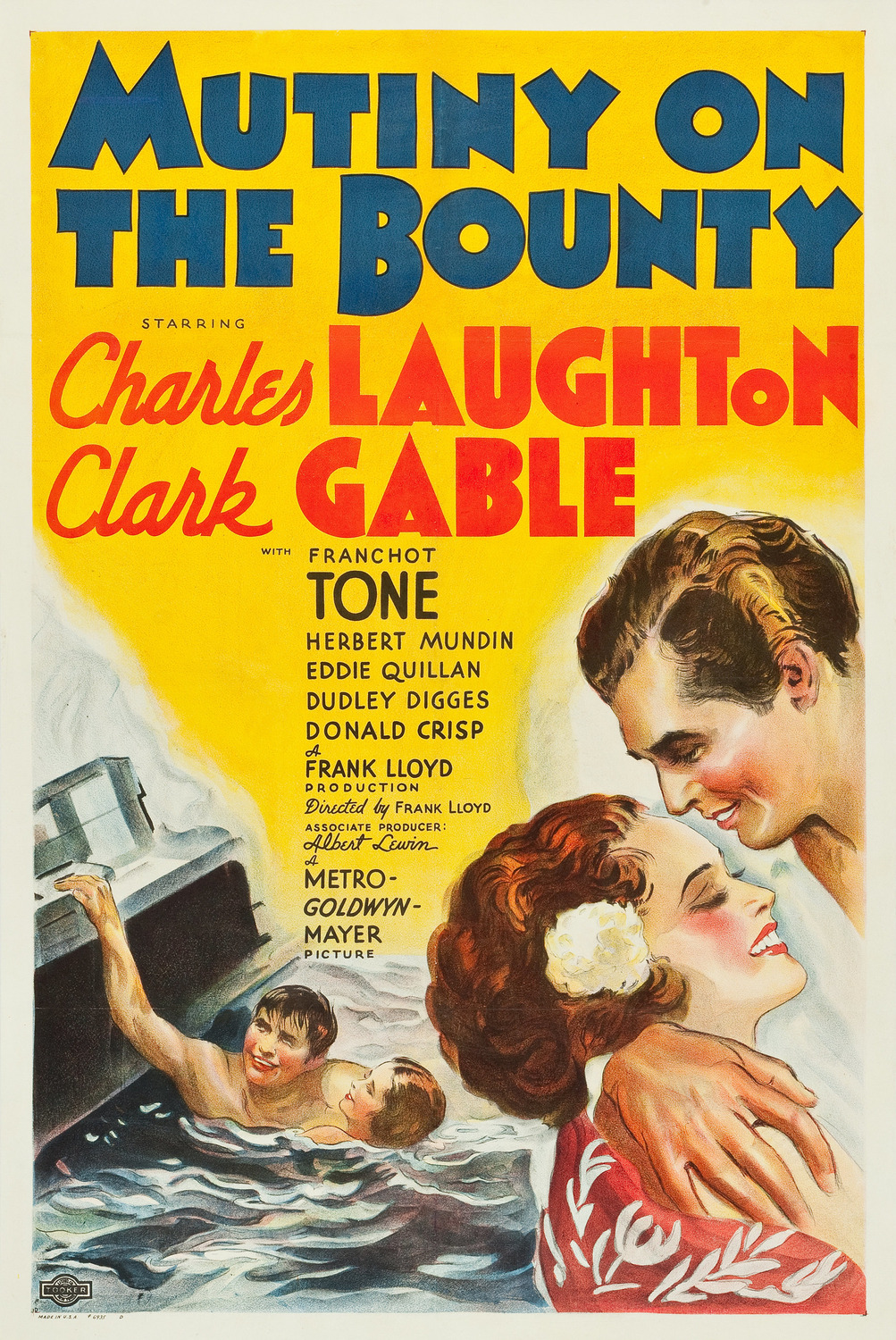In 1935, Mutiny on the
Bounty beat out Les Miserables, David Copperfield, and A Midsummer Night’s Dream for best
picture. Featuring the talents of Charles Laughton, Clark Gable, Franchot Tone,
Movita, and Mamo, the film was directed by Frank Lloyd and based off the
Charles Nordhoff and James Norman Hall novel based off the historical event. Laughton,
Gable and Tone were also nominated for Best Actor and this film is responsible
for the creation of Best Supporting Actor.
 The film starts as the HMS Bounty leaves England for a
two-year voyage over the Pacific Ocean. The captain, William Bligh (Laughton)
is a brutal tyrant who loves administering harsh punishment to his officers and
crew. Fletcher Christian (Gable) is the ships lieutenant and disapproves of
Bligh’s captaincy. At the same time, midshipman Roger Byam (Tone) is divided
between his loyalty to his family’s naval tradition and friendship with
Christian.
The film starts as the HMS Bounty leaves England for a
two-year voyage over the Pacific Ocean. The captain, William Bligh (Laughton)
is a brutal tyrant who loves administering harsh punishment to his officers and
crew. Fletcher Christian (Gable) is the ships lieutenant and disapproves of
Bligh’s captaincy. At the same time, midshipman Roger Byam (Tone) is divided
between his loyalty to his family’s naval tradition and friendship with
Christian.
During the voyage, Christian and Bligh’s animosity towards
each other grows when Christian challenges Bligh’s unjust practices. Upon
arrival in Tahiti, where the crew acquires breadfruit plants to take back to
England, Bligh refuses to let Christian leave the ship. Meanwhile, Byam sets up
shop and lives with the island Chief, Hitihiti, and his daughter, Tehanni
(Movita) while translating an English-Tahitian dictionary. Hitihiti persuades
Bligh to allow Christian a day pass, but Bligh soon repeals it out of spite. He
disregards the order and romances a Miamiti (Mamo), a local girl. When they
leave, Christian promises her he will be back someday.
After leaving, the crew talks of mutiny after Bligh’s
discipline kills the ship’s well-loved surgeon and cuts water rationing for the
crew in favor of providing water for the cargo. While initially disapproving of
mutiny, he changes his mind after seeing crew members in iron chains. The crew
overthrows the ship and cast Bligh and those loyal to him adrift. Bligh is able
to lead them back to a safe harbor.
Christian orders the Bounty return to Tahiti, but Byam, who
was in his cabin during the mutiny, disapproves of the mutiny and decide he and
Christian can no longer be friends. When back on Tahiti, Byam marries Tehanni
and Christian marries and has a child with Miamiti. They soon reconcile their
friendship. But the HMS Pandora is spotted off shore and the two decide to part
ways. Byam and some of the crew remain on the island for the ship to take them
back to England while Christian, the rest of the crew, Miamiti and other
Tahitians board the Bounty to search for a new island refuge.
On the Pandora, Byam finds out that Bligh is the captain and
suspects him in the mutiny. He therefore has Byam imprisoned. Upon return to
England, Byam is court-martialed and found guilty but still speaks of Bligh’s
tyrannical captaincy aboard the bounty. Byam’s friends Sir Joseph Backs and
Lord Hood intervene for him, leading to a pardon by King George III.
As for Christian, he finds Pitcairn, an uninhabited,
sustainable island that he sees as adequate refuge from the Royal Navy. He
orders the Bounty be crashed and burned while those on the ship settle on the
island.
A film based off a book based off of true events. As the
synopsis says, the entire first half of the film sets up the titular mutiny and
it does a decent job it of it. Bligh’s punishments are incredibly
disproportionate to the infractions, giving you a great reason to hate him. Christian
and Byam are also relatable characters, the former who constantly tries to be
the level headed voice of reason and the latter who is conflicted in loyalties.
With locations of the film including French Polynesia and
Catalina, the visuals are really good. They also used the Sailing Ship
Restaurant in San Francisco. The music was good too, having traditional
soundtrack music as well as sea shanties.
However, the film is a good example of Hollywood’s penchant
of over-dramatization. As stated above, the film is pretty inaccurate. In real
life, Bligh wasn’t the monster he’s made out to be. Pitcairn was also a catastrophic
failure as self-government. But despite the inaccuracies, the film is pretty
good.
I’m not sure why this got best picture. Probably for its
depiction of a crew overthrowing a tyrant and setting up their own government.
Final Call: Historically inaccurate, but still has a good
plot with great acting and impressive visuals. It’s replacing All Quiet on the Western Front as my #3.
No comments:
Post a Comment